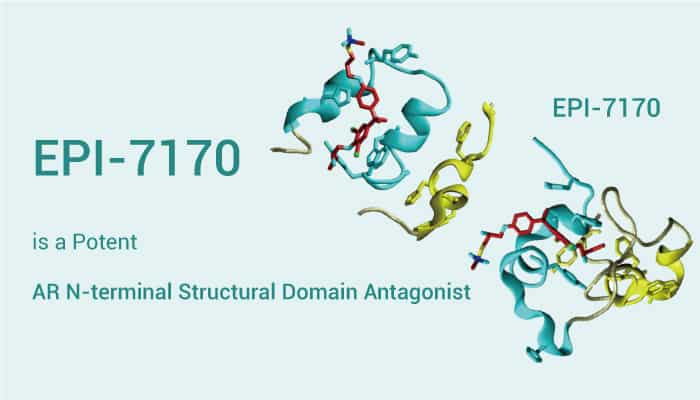EPI-7170, a Ralaniten analogue, is a potent androgen receptor N-terminal structural domain antagonist. It blocks the transcriptional activity of full-length AR (FL-AR) and AR splice variants (AR-Vs).
EPI-7170 (0-12 μM, 24 or 48 h) inhibits cell proliferation in VCaP-ENZR and C4-2B-ENZR cells. Additionally, it also enhances the effect of Enzalutamide which has a lower IC50 when bound to EPI-7170. EPI-7170 (0-20 μM, 24 or 48 h) synergistically inhibits androgen receptor (AR) transcriptional activity in ENZR cells. And the ENZR cells express androgen receptor splice variant-7 (AR-V7) with Enzalutamide.
EPI-7170 (3.5 μM, 48 h) results in an increase in the G1 phase and a decrease in the S phase and reduces the expression levels of CDK4, cyclin D1, and cyclin A2 proteins. And Combination of EPI‐7170 and ENZ results in nearly complete inhibition of DNA synthesis in the S phase. Moreover, consistent results also exist with the clonogenic assay. Combinations of ENZ (20 µM) with low dose EPI‐7170 (2.5 µM) are more effective than monotherapies in C4‐2B‐ENZR cells

EPI-7170 (oral administration, 30 mg/kg, daily, 31 days) has some anti-tumor activity and is combined with Enzalutamide in male NOD/SCID mice. It significantly reduces tumor volume and decreased levels of FL-AR and AR-V7 in harvested xenografts.
EPI‐7170 alone significantly decreases the final tumor volume compared to the controls. Additionally, the combination of ENZ and EPI‐7170 significantly decreases tumor volume compared to ENZ alone. However, there exists no statistically significant difference measurable by tumor volume between the combination therapy and EPI alone. Besides, there shows no significant change in body weight among the treatment groups.
In conclusion, EPI‐7170 is an AR N-terminal structural domain antagonist. What’s more, it has antitumor effects against Enzalutamide-resistant castration-resistant prostate cancer (CRPC).
Reference:
Hirayama Y, et al. Mol Oncol. 2020 Oct;14(10):2455-2470.